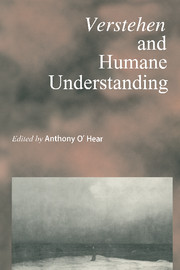Book contents
- Frontmatter
- Contents
- Notes on Contributors
- Preface
- ‘Two Cultures’ Revisited
- Rational and Other Animals
- Vico and Metaphysical Hermeneutics
- Three Major Originators of the Concept of Verstehen: Vico, Herder, and Schleiermacher
- Weber's Ideal Types as Models in the Social Sciences
- Verstehen, Holism and Facism
- Interpretation in History: Collingwood and Historical Understanding
- The Meaning of the Hermeneutic Tradition in Contemporary Philosophy
- Science and Psychology
- To Mental Illness via a Rhyme for the Eye
- Can There be an Epistemology of Moods?
- Feeling and Cognition
- Believing in order to Understand
- Data and Theory in Aesthetics: Philosophical Understanding and Misunderstanding
- Anti-Meaning as Ideology: The Case of Deconstruction
- Perictione in Colophon
- Index of Names
Vico and Metaphysical Hermeneutics
Published online by Cambridge University Press: 17 May 2010
- Frontmatter
- Contents
- Notes on Contributors
- Preface
- ‘Two Cultures’ Revisited
- Rational and Other Animals
- Vico and Metaphysical Hermeneutics
- Three Major Originators of the Concept of Verstehen: Vico, Herder, and Schleiermacher
- Weber's Ideal Types as Models in the Social Sciences
- Verstehen, Holism and Facism
- Interpretation in History: Collingwood and Historical Understanding
- The Meaning of the Hermeneutic Tradition in Contemporary Philosophy
- Science and Psychology
- To Mental Illness via a Rhyme for the Eye
- Can There be an Epistemology of Moods?
- Feeling and Cognition
- Believing in order to Understand
- Data and Theory in Aesthetics: Philosophical Understanding and Misunderstanding
- Anti-Meaning as Ideology: The Case of Deconstruction
- Perictione in Colophon
- Index of Names
Summary
My aim in this paper is to outline and discuss Vico's conception of the nature and importance of hermeneutics. Vico never used the word ‘hermeneutics’ but since we would now recognize one aspect of what he was offering in his New Science as a theory for the interpretation and understanding of past cultures, I shall occasionally talk in terms of a theory of hermeneutics. My procedure will be to indicate first the context which led Vico to think that it was important to have a theory of hermeneutics and why he thought that such a theory ought to have a certain form. I shall then try to show that there are two forms of the theory. The first, in which hermeneutics is dependent upon metaphysics, involves certain unacceptable features which arise from the context in which he originally formulated it. The second, in which metaphysics is dependent upon hermeneutics, requires that the theory be freed from an important aspect of this context. Finally, I shall ask whether, in this second form, the theory has something to commend it to contemporary thinkers.
On the question of the context in which Vico came to develop a theory of hermeneutics, I shall make two brief initial points. The first is that, from a very early period in his thought, Vico was convinced that philosophy ought to include among its concerns theories which would enable us to know how to regulate societies in such a way as to be of benefit to their members.
- Type
- Chapter
- Information
- Verstehen and Humane Understanding , pp. 29 - 46Publisher: Cambridge University PressPrint publication year: 1997



